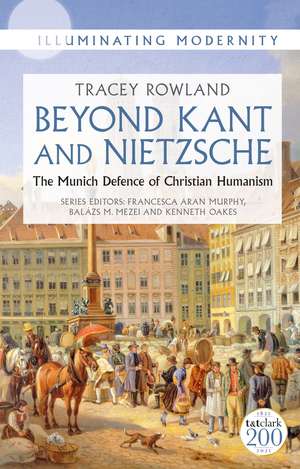Beyond Kant and Nietzsche: The Munich Defence of Christian Humanism: Illuminating Modernity
Autor Tracey Rowlanden Limba Engleză Paperback – 22 mar 2023
| Toate formatele și edițiile | Preț | Express |
|---|---|---|
| Paperback (1) | 189.36 lei 6-8 săpt. | |
| Bloomsbury Publishing – 22 mar 2023 | 189.36 lei 6-8 săpt. | |
| Hardback (1) | 465.45 lei 6-8 săpt. | |
| Bloomsbury Publishing – 25 aug 2021 | 465.45 lei 6-8 săpt. |
Preț: 189.36 lei
Preț vechi: 248.28 lei
-24% Nou
Puncte Express: 284
Preț estimativ în valută:
36.24€ • 39.35$ • 30.44£
36.24€ • 39.35$ • 30.44£
Carte tipărită la comandă
Livrare economică 23 aprilie-07 mai
Preluare comenzi: 021 569.72.76
Specificații
ISBN-13: 9780567703200
ISBN-10: 0567703207
Pagini: 200
Dimensiuni: 138 x 216 x 25 mm
Greutate: 0.24 kg
Editura: Bloomsbury Publishing
Colecția T&T Clark
Seria Illuminating Modernity
Locul publicării:London, United Kingdom
ISBN-10: 0567703207
Pagini: 200
Dimensiuni: 138 x 216 x 25 mm
Greutate: 0.24 kg
Editura: Bloomsbury Publishing
Colecția T&T Clark
Seria Illuminating Modernity
Locul publicării:London, United Kingdom
Caracteristici
Profiles six Catholic scholars - Carl Muth, Theodor Haecker, Theodor Steinbüchel, Gottlieb Söhngen , Romano Guardini, and Erich Przywara
Notă biografică
Tracey Rowland holds the St John Paul II (Research) Chair of Theology at the University of Notre Dame, Australia.
Cuprins
IntroductionChapter 1Carl MuthChapter 2Theodor HaeckerChapter 3Theodor SteinbüchelChapter 4Gottlieb SöhngenChapter 5Romano GuardiniChapter 6Erich Przywara ConclusionBibliographyIndex
Recenzii
Rowland has produced a valuable, relevant resource for historical and contemporary conversations on issues related to the transformative power of ideology, the existential significance of theology for the cultivation of personal identity, and the possibilities of embodying the values of a Christian worldview in an increasingly pluralistic public square.
[T]he author ... succeeds admirably in opening up for readers key themes as developed by the figures who are the subject of this work.
The internationally noted Australian theologian Tracey Rowland has produced yet another valuable and truly "illuminating" study. Gifted with knowledge in the language and culture of Goethe, Rowland capably sheds light on a, rich and variegated intellectual milieu little known to non-Germans. It is the valiant struggle to counter the materialism of National-Socialism and analogous ideologies with a vigorous restatement of the Catholic genius. This precious book fills a much-felt lacuna. Highly recommended.
Rowland serves a feast of recovered treasures in her excavation of six major pre-war German Catholic intellectuals who helped shape the best thinkers of the Conciliar years. She writes with erudition, clarity and a deep concern for the restoration of Catholic culture.
Professor Rowland's text details a time-period lost and unknown to many of us who care about the history of Catholic theology, especially those of us who are in the Anglophone academic world. The stories of the contributions of these German theologians and their influence on the Second Vatican Council are fascinating. Rowland has done a great service in introducing us to these theologians with her text.
[T]he author ... succeeds admirably in opening up for readers key themes as developed by the figures who are the subject of this work.
The internationally noted Australian theologian Tracey Rowland has produced yet another valuable and truly "illuminating" study. Gifted with knowledge in the language and culture of Goethe, Rowland capably sheds light on a, rich and variegated intellectual milieu little known to non-Germans. It is the valiant struggle to counter the materialism of National-Socialism and analogous ideologies with a vigorous restatement of the Catholic genius. This precious book fills a much-felt lacuna. Highly recommended.
Rowland serves a feast of recovered treasures in her excavation of six major pre-war German Catholic intellectuals who helped shape the best thinkers of the Conciliar years. She writes with erudition, clarity and a deep concern for the restoration of Catholic culture.
Professor Rowland's text details a time-period lost and unknown to many of us who care about the history of Catholic theology, especially those of us who are in the Anglophone academic world. The stories of the contributions of these German theologians and their influence on the Second Vatican Council are fascinating. Rowland has done a great service in introducing us to these theologians with her text.






